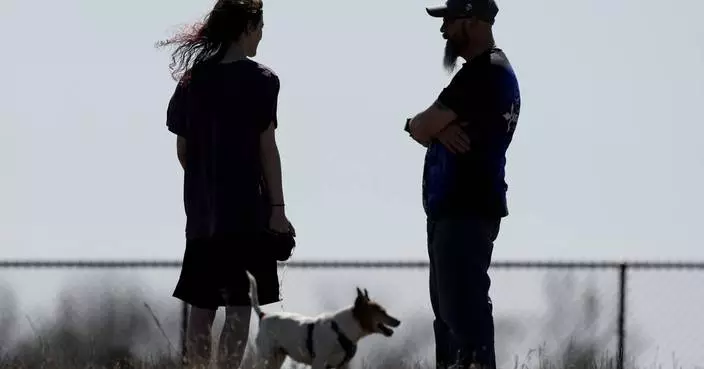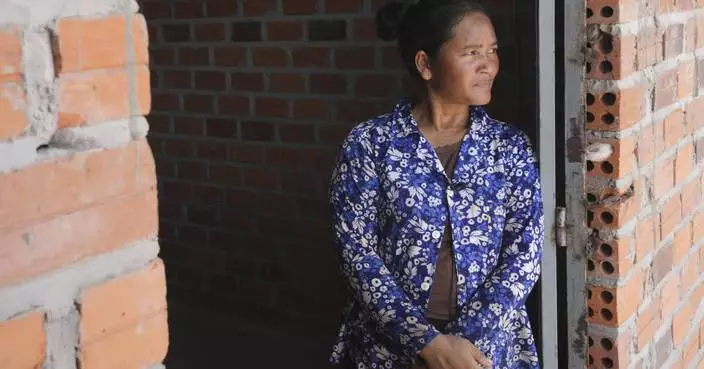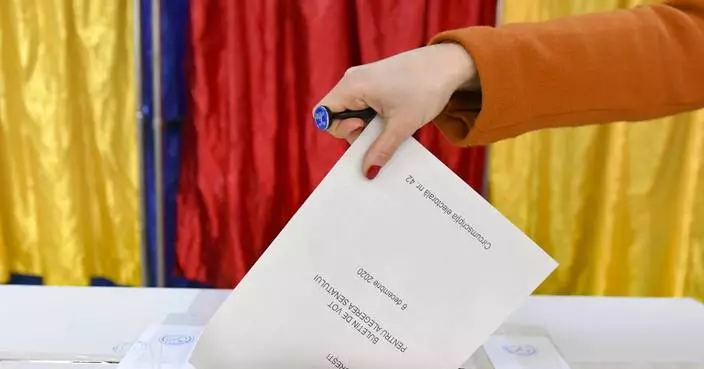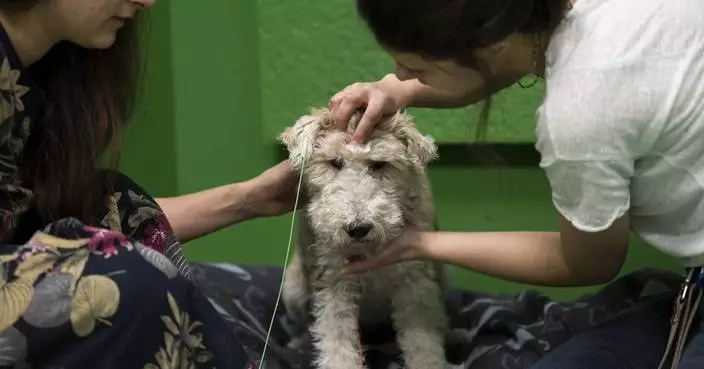Why do people have such big brains? Some researchers asked a really powerful brain — a computer — and got back a surprising answer.
In relation to body size, our brains are huge, about six times larger than one would expect from other mammals. And this three-pound organ sucks up fully 20 percent of the body's energy needs. Evolutionary theory says to build and maintain something that costly, there must have been a very good reason.
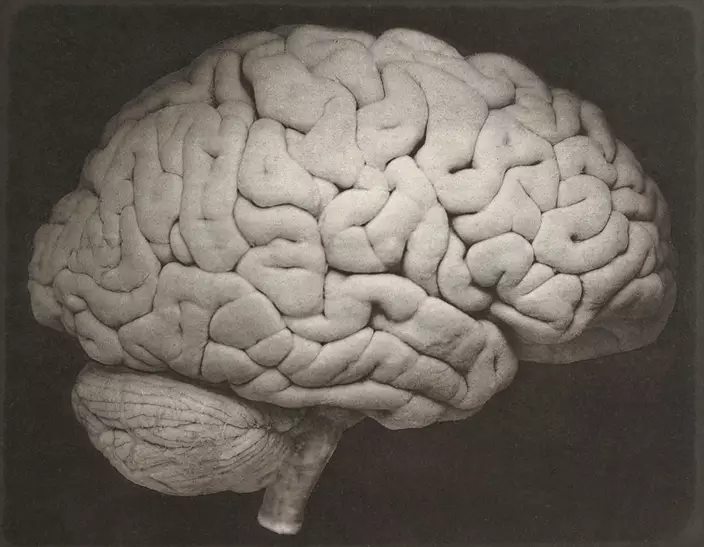
This 1885 photo shows a side view of a human brain. In relation to body size, our brains are huge, about six times larger than one would expect from other mammals. And this three-pound organ sucks up fully 20 percent of the body’s energy needs. (Oscar G. Mason/J.C. Dalton/Philadelphia, Lea Brothers & Co. via AP)
But what is it? Did our ancestors need more brainpower to cope with the environment, such as finding and storing food? Or was it driven more by the social complexities of dealing with their peers? Or was it all about the challenge of learning and teaching cultural knowledge?
In the past, scientists have tried to tease out an answer mostly by analyzing correlations, like how brain size relates to the size of social groups in living apes and our fossil ancestors.
Mauricio Gonzalez-Forero and Andy Gardner of St. Andrews University in Scotland turned instead to computer simulations. They report the result in a paper released Wednesday by the journal Nature.
The researchers created a hypothetical population of females, focusing on just one sex for simplicity, and followed them as they faced the challenges of living. The researchers plugged in data on things like a newborn's brain size and the energy costs of the brain and reproductive organs. And they simulated tasks that resemble the environmental and social challenges included in theories about brain evolution.
The computer pondered how the pressures of each challenge might affect changes of brain size over time. Drawing on evolutionary theory, it calculated how much energy the females would be expected to invest in growing the brain versus other tissues under the different challenges. It found that stronger mental demands tended to produce bigger brains.
Gonzalez-Forero said he and Gardner expected a strong contribution to bigger brains from social challenges, which he said has been the favorite idea for decades.
But their surprise, the computer said about 60 percent of the effect on boosting brain size came from an individual dealing with the environment on one's own, as in finding, storing and cooking food, and making stone tools. Another 30 percent came from cooperating to deal with the environment, such as banding together to hunt. The final 10 percent from competition between groups of people.
While the study didn't specifically look at the impact of cultural tasks, it gave evidence of a substantial influence from them, too, Gonzalez-Forero said. He plans to assess cultural factors in the future.
In any case, the results are not intended to be the final word, but rather an encouragement for other researchers to use computer simulation for studying the question of brain size. Much exciting work remains to be done, he said.
Experts unconnected to the study were skeptical of the conclusions.
Dean Falk, a brain-evolution expert at Florida State University, said the work doesn't assess the longstanding hypothesis that the development of language may have driven expansion of the brain. Gonzalez-Forero said the language idea is to some extent part of the cultural factors that remain to be addressed.
Falk also said the simulation strategy may have overemphasized the role of energy demands in influencing brain growth.
Robin Dunbar, a professor of evolutionary psychology at Oxford University, and paleoanthropologist Richard Potts of the Smithsonian Institution said they didn't think the simulation adequately mimicked the lives our ancestors lived.
WASHINGTON (AP) — Japanese Prime Minister Fumio Kishida addressed U.S. lawmakers at the Capitol on Thursday, urging them to consider the importance of global commitments at a time of tension in the Asia-Pacific and deep skepticism in Congress about U.S. involvement abroad.
Kishida is in Washington this week visiting President Joe Biden as the White House completes hosting each leader of the Quad — an informal partnership between the U.S. Japan, Australia and India that is seen as important to countering China's growing military strength in the region. Kishida highlighted the value of the U.S. commitment to global security and offered reassurances that Japan is a strong partner.
On Capitol Hill, his audience included many Republicans who have pushed for the U.S. to take a less active role in global affairs as they follow the “America First" ethos of Donald Trump, the presumptive Republican presidential nominee. The Republican-controlled House has sat for months on a $95 billion package that would send wartime funding to Ukraine and Israel, as well as aid to allies in the Indo-Pacific like Taiwan and humanitarian help to civilians in Gaza and Ukraine.
“As we meet here today, I detect an undercurrent of self-doubt among some Americans about what your role in the world should be,” Kishida told Congress.
He sought to remind lawmakers of the leading role the U.S. has played globally since World War II. After dropping two nuclear weapons on Japan to end the war, the U.S. helped rebuild Japan, and the nations transformed from bitter enemies to close allies.
“When necessary, it made noble sacrifices to fulfill its commitment to a better world,” Kishida said of the U.S.
Japan has taken a strong role in supporting Ukraine's defense against Moscow as well as helping humanitarian aid get to Gaza. It is also seen as a key U.S. partner in a fraught region where China is asserting its strength and North Korea is developing a nuclear program.
Senate Majority Leader Chuck Schumer said in a floor speech Thursday, “The best way the House can heed Prime Minister Kishida’s words is to pass the national security supplemental as soon as possible, to approve defense funding not just for Ukraine but also for the Indo-Pacific.”
Senate Republican Leader Mitch McConnell also said earlier this week that he hoped Kishida’s visit would underscore “that we’re in a worldwide situation here against the enemies of democracy — led by China, Russia and Iran.”
Kishida offered reassurances that Japan is also committed to global security and human rights. He said that since recovering from the “devastation of World War II,” Japan has transformed from a reticent ally to a strong partner “standing shoulder-to-shoulder” with the U.S.
The prime minister called China’s stance “unprecedented” and “the greatest strategic challenge, not only to the peace and security of Japan but to the peace and stability of the international community at large.”
Kishida was also attending a U.S.-Japan-Philippines summit on Thursday in another effort to bolster regional cooperation in the face of China’s aggression. The United Kingdom also announced Thursday that it would hold joint military exercises with Japan and the U.S. in the Indo-Pacific next year.
Beijing has pushed back strongly on those actions during Kishida's visit.
Mao Ning, the Chinese foreign ministry spokeswoman, said, “Despite China’s serious concerns, the U.S. and Japan attacked and smeared China on the Taiwan question and maritime issues, grossly interfered in China’s domestic affairs and violated the basic norms in international relations.”
Meanwhile, Kishida cast the future of the conflict in Ukraine as having far-reaching consequences. He emphasized that Japan has committed to providing Kyiv with $12 billion in wartime aid, including anti-drone detection systems.
“Ukraine of today may be East Asia of tomorrow,” Kishida told lawmakers, and later added: “Japan will continue to stand with Ukraine.”
The statements drew standing ovations from much of the chamber but a group of hardline conservatives remained seated. Other lawmakers skipped the speech and Capitol staff filled empty chairs with congressional aides.
Those moments encapsulated the pressure that House Speaker Mike Johnson is facing as he searches for a way forward for the foreign security package. It will be a difficult task to navigate the deep divides among Republicans. Making matters worse for the Republican speaker, he is already facing the threat of being ousted from the speaker's office.
In a statement after the address, Johnson praised the U.S. partnership with Japan and said, "We will not let tyrants disrupt the prosperity and security we all enjoy.”
Kishida, who was elected in 2021, arrived in Washington while facing political problems of his own in Japan. Polls show his support has plunged as he deals with a political funds corruption scandal within his ruling Liberal Democratic Party. The nation's economy has also slipped to the world's fourth-largest last year, falling behind Germany.
This is the first time a Japanese prime minister addresses Congress since Shinzo Abe traveled to Capitol Hill in 2015. Kishida is the sixth foreign leader to address Congress during Biden's presidency.
He relished the moment and highlighted his ties to the U.S. He told lawmakers how he spent his first three years of elementary school in New York City while his father worked there as a trade official. Lawmakers applauded and laughed as he recalled American pastimes like attending baseball games and watching the Flintstones.
“I still miss that show,” Kishida told them. “Although I could never translate, ‘Yabba dabba doo.’”
Associated Press writer Didi Tang contributed.
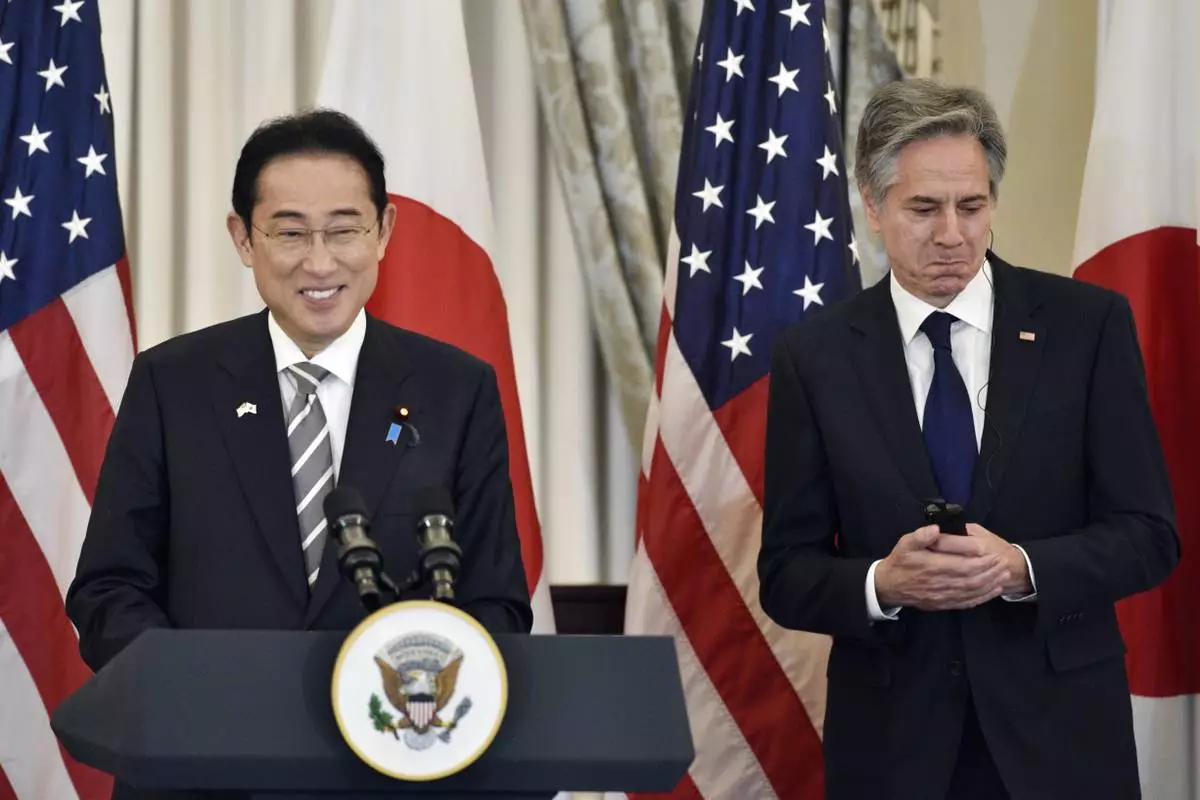
Secretary of State Antony Blinken, right, listens as Japanese Prime Minister Fumio Kishida speaks before a luncheon at the State Department in Washington, Thursday, April 11, 2024. (AP Photo/Cliff Owen)
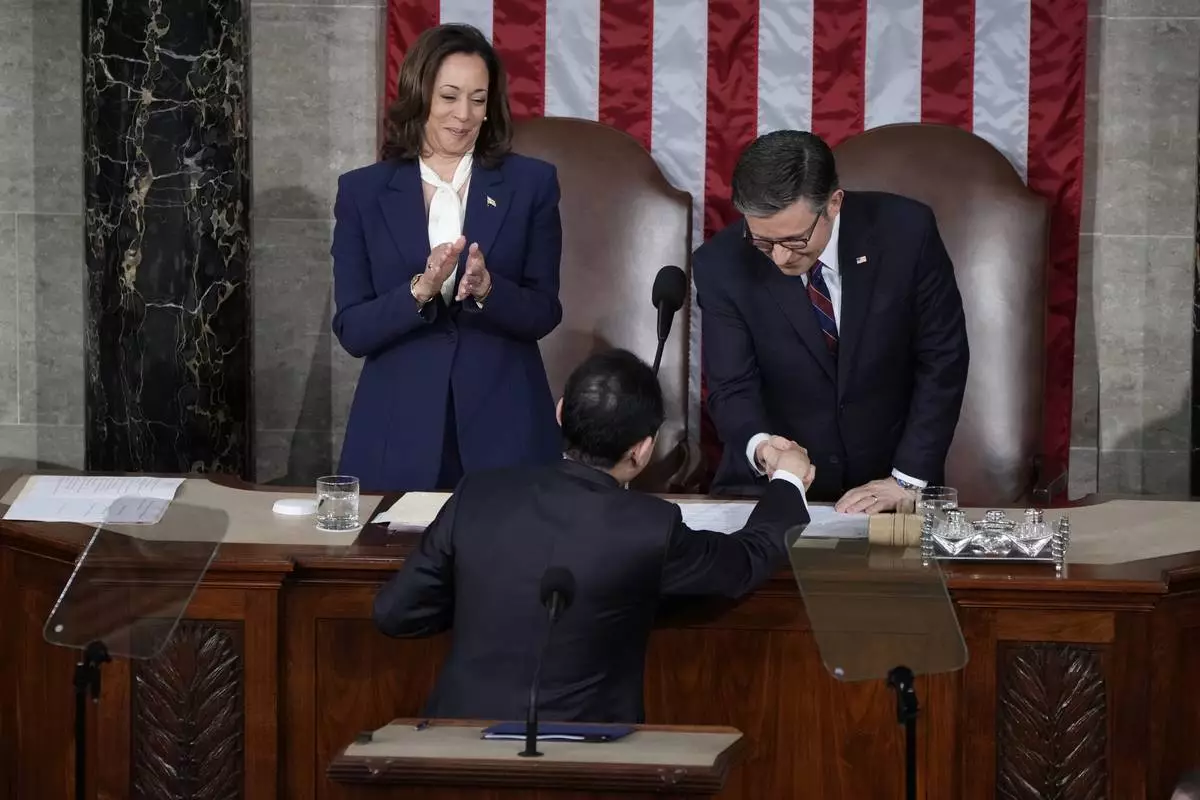
Japan's Prime Minister Fumio Kishida shakes hands with Speaker of the House Mike Johnson, R-La., before ddressing a joint meeting of Congress in the House chamber, Thursday, April 11, 2024, at the Capitol in Washington, as Vice President Kamala Harris looks on. (AP Photo/Jacquelyn Martin)
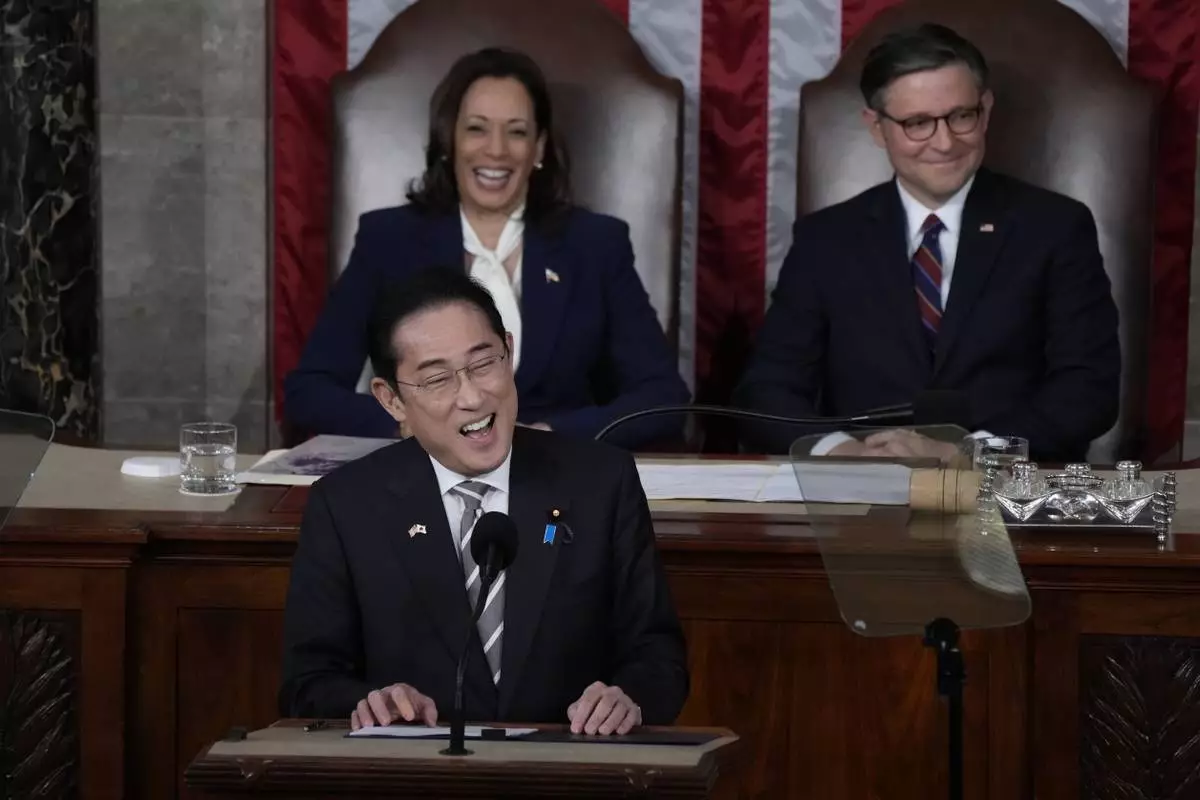
Japan's Prime Minister Fumio Kishida addresses a joint meeting of Congress in the House chamber, Thursday, April 11, 2024, at the Capitol in Washington, as Vice President Kamala Harris and Speaker of the House Mike Johnson, R-La., look on. (AP Photo/Jacquelyn Martin)
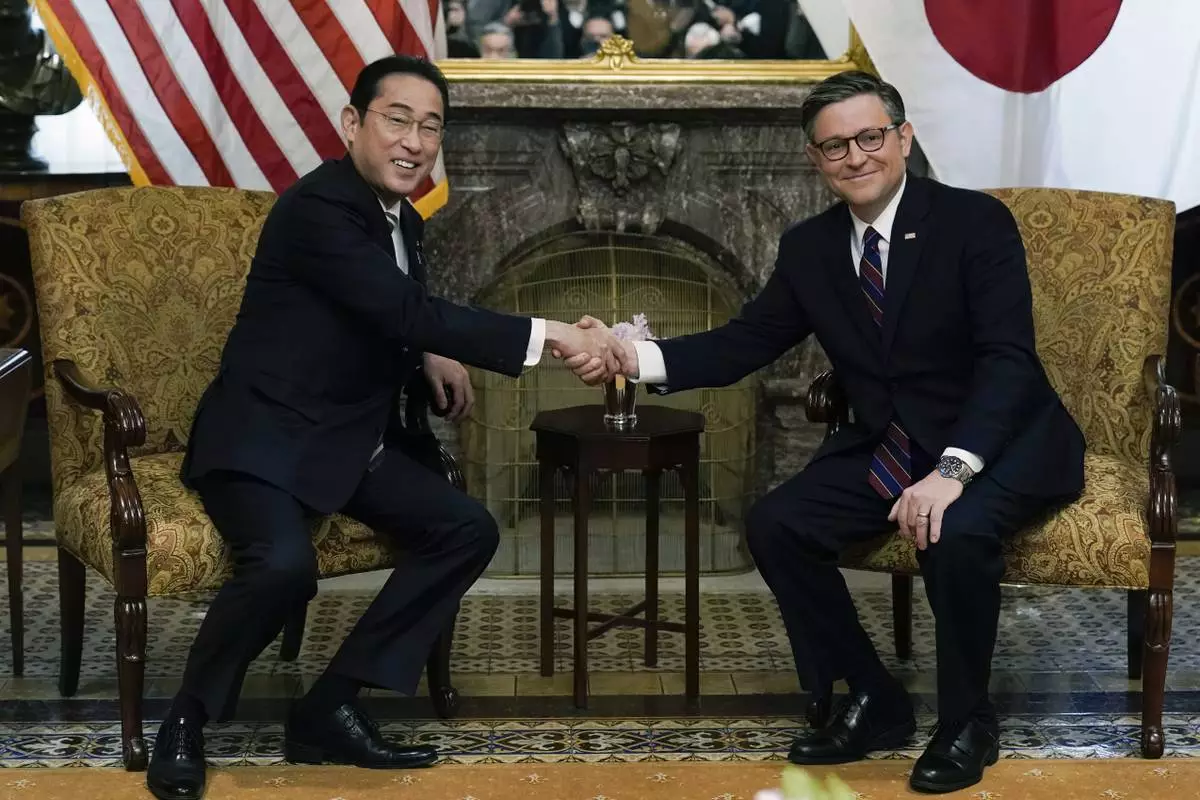
Speaker of the House Mike Johnson, R-La., meets with Japanese Prime Minister Fumio Kishida at the U.S. Capitol, Thursday, April 11, 2024, in Washington. (AP Photo/Jose Luis Magana)
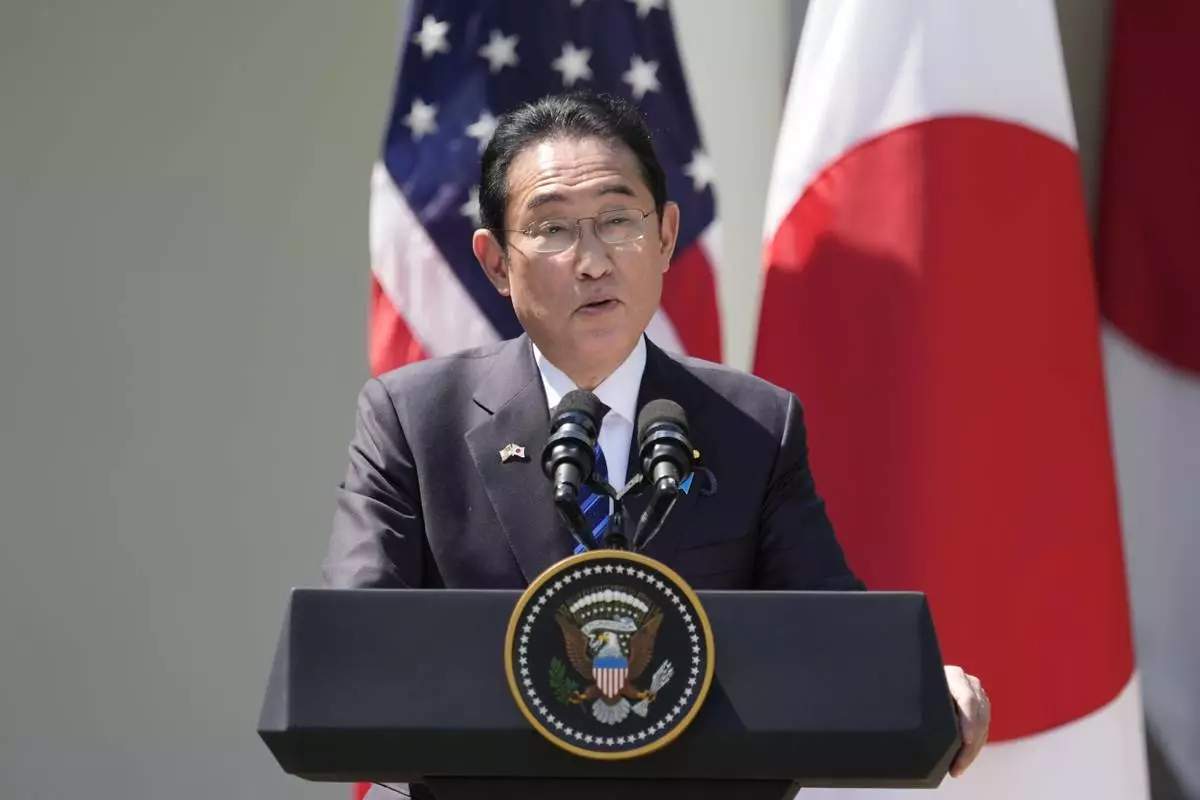
FILE - Japanese Prime Minister Fumio Kishida speaks during a news conference in the Rose Garden of the White House, April 10, 2024, in Washington. Fumio will head to Congress on Thursday, April 11, for an address to U.S. lawmakers meant to underscore the importance of keeping a strong partnership between the two countries at a time of tension in the Asia-Pacific. (AP Photo/Alex Brandon, File)










